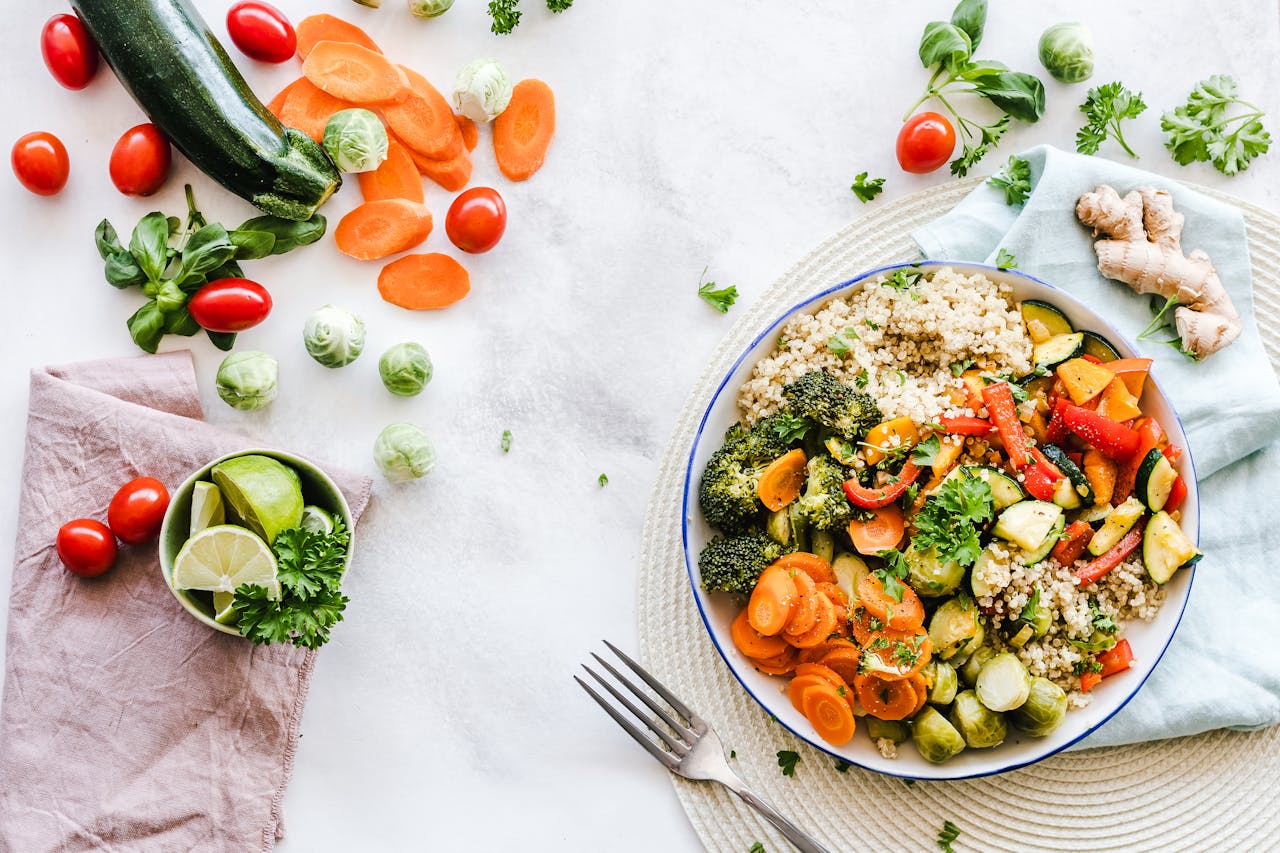Is A Plant-Based Diet The Solution To America’s Health Crisis?
Introduction
America is in the midst of a health crisis. From rising obesity rates to an increase in chronic diseases, it’s clear that our approach to eating and wellness needs a major overhaul. But what if there was a simple, sustainable solution that could help reverse these alarming trends? Enter the plant-based diet. In this blog post, we’ll explore whether adopting a plant-based diet could be the key to transforming America’s health landscape. We’ll dive into the benefits, debunk some myths, and provide practical advice for those ready to make the switch. Whether you’re just starting your journey toward a healthier diet or looking to take your nutrition to the next level, this ultimate guide will give you the tools and inspiration you need.
The idea of changing an unhealthy diet to one that’s plant-based might seem daunting at first, but with the right information, you’ll find it’s easier and more rewarding than you think. We’ll cover everything from the first steps you should take, to the long-term benefits of this lifestyle. So, if you’re ready to explore whether a plant-based diet could be the solution to America’s health crisis, keep reading. This could be the transformative change you’ve been searching for.
1. The State of America’s Health: A Crisis in the Making
America’s health statistics paint a concerning picture. With more than 40% of the population classified as obese and chronic diseases such as heart disease, diabetes, and certain cancers on the rise, it’s clear that our current dietary patterns are contributing to an epidemic of poor health. The typical American diet, often high in processed foods, sugars, and unhealthy fats, is a major culprit behind these issues. But while the problem is clear, the solution might be closer than we think—right on our plates.
A shift towards a plant-based diet could be the answer to reversing these trends. By focusing on whole, unprocessed foods like fruits, vegetables, grains, and legumes, we can reduce the intake of harmful ingredients that contribute to chronic illnesses. Plant-based diets are naturally lower in calories and unhealthy fats while being rich in fiber, vitamins, and minerals that our bodies need to thrive. This section will delve into the root causes of America’s health crisis and explore how changing to a healthier diet could be the first step toward a healthier nation.
2. The Power of Plants: Nutritional Benefits of a Plant-Based Diet
The benefits of a plant-based diet extend far beyond just weight loss. A well-planned plant-based diet provides all the essential nutrients your body needs to function optimally. Fruits, vegetables, whole grains, and legumes are packed with vitamins, minerals, antioxidants, and fiber, all of which play a crucial role in maintaining health. For instance, the fiber found in plant foods helps regulate digestion, keeps you full longer, and can lower cholesterol levels. Meanwhile, the antioxidants found in fruits and vegetables help combat inflammation and reduce the risk of chronic diseases.
Switching to a plant-based diet also has the potential to transform your health in ways that you might not expect. Many people who adopt this lifestyle report increased energy levels, better skin, improved mood, and even enhanced mental clarity. Moreover, a plant-based diet is naturally low in saturated fats and free from cholesterol, making it a heart-healthy choice. By embracing the power of plants, you’re not just eating to survive—you’re eating to thrive.
3. First Steps: How to Start Your Plant-Based Journey
Transitioning to a plant-based diet doesn’t have to be overwhelming. In fact, taking small, manageable steps can make the process enjoyable and sustainable. One of the first steps you can take is to start incorporating more plant-based foods into your meals. For example, try adding a variety of colorful vegetables to your plate or swapping out meat for beans or lentils in your favorite recipes. These simple changes can make a big difference in your overall health.
Another great way to ease into a plant-based lifestyle is by setting achievable goals. You might start with something as simple as going meatless one day a week, like on Meatless Monday. This allows you to gradually explore plant-based meals without feeling deprived. Over time, as you become more comfortable, you can increase the number of plant-based meals in your diet. Remember, the goal isn’t perfection, but progress. Each step you take towards a healthier diet is a step towards transforming your health and potentially contributing to a broader solution to America’s health crisis.
4. Breaking Myths: Common Misconceptions About Plant-Based Eating
One of the biggest barriers to adopting a plant-based diet is the prevalence of myths and misconceptions. For example, many people believe that a plant-based diet doesn’t provide enough protein or that it’s expensive and difficult to maintain. However, these concerns are largely unfounded. There are plenty of plant-based protein sources, such as beans, lentils, tofu, and quinoa, that can easily meet your nutritional needs. In fact, many athletes thrive on plant-based diets, proving that you can build strength and muscle without consuming animal products.
Another common myth is that plant-based diets are bland or boring. This couldn’t be further from the truth! The variety of fruits, vegetables, grains, and legumes available means that your meals can be just as flavorful and satisfying as those that include meat. With a little creativity and experimentation, you can discover a whole new world of delicious plant-based dishes that will keep your taste buds excited. This section will debunk these and other myths, giving you the confidence to make the change to a healthier diet.
5. Transform Your Health: The Long-Term Benefits of Plant-Based Eating
The long-term benefits of adopting a plant-based diet are impressive and well-documented. Research shows that people who follow plant-based diets tend to have lower risks of chronic diseases, such as heart disease, type 2 diabetes, and certain cancers. Moreover, plant-based eaters often experience improved digestion, better weight management, and enhanced mental well-being. The reason is simple: plant-based foods are packed with nutrients that our bodies need to function at their best.
One personal story that illustrates the transformative power of plant-based eating is my own. I struggled with an unhealthy diet for years, often feeling sluggish and unmotivated. When I finally decided to make the switch to a plant-based diet, the changes were nothing short of remarkable. Within a few weeks, I noticed a significant boost in my energy levels, clearer skin, and even a more positive outlook on life. It was as if I had discovered the ultimate guide to health—right in my own kitchen. This experience reinforced my belief that a plant-based diet could be a key solution to America’s health crisis.
6. Socializing and Eating Out: Navigating the Plant-Based Lifestyle
Social situations and dining out can be challenging when you’re committed to a plant-based diet, but they don’t have to be a deal-breaker. With a little planning and flexibility, you can enjoy meals with friends and family without compromising your dietary choices. When eating out, look for restaurants that offer plant-based options or are willing to customize dishes to fit your needs. Many restaurants now cater to plant-based eaters, offering everything from veggie-packed salads to hearty grain bowls.
When attending social gatherings, consider bringing a plant-based dish to share. Not only does this ensure that you have something to eat, but it also introduces others to the delicious possibilities of plant-based cooking. Over time, you’ll find that navigating social situations becomes second nature. The key is to stay confident in your choices and remember why you embarked on this journey in the first place—to transform your health and contribute to a healthier diet for all.
7. Changing America’s Health: Could Plant-Based Eating Be the Answer?
The evidence is clear: a plant-based diet offers numerous health benefits that could help address many of the issues at the heart of America’s health crisis. By shifting our focus to whole, plant-based foods, we can reduce the prevalence of chronic diseases, lower healthcare costs, and improve overall quality of life. While adopting a plant-based diet is a personal choice, it’s one that can have far-reaching implications for society as a whole.
Imagine a future where the majority of Americans follow a plant-based diet. The impact on public health would be profound. Fewer people would suffer from diet-related illnesses, and the burden on our healthcare system would be significantly reduced. Moreover, the environmental benefits of widespread plant-based eating would help combat climate change and preserve natural resources for future generations. Changing our unhealthy diet patterns is not just about individual health—it’s about creating a healthier, more sustainable world for everyone.
Frequently Asked Questions
- Is it difficult to get enough nutrients on a plant-based diet? Not at all! With a well-planned plant-based diet, you can easily meet your nutritional needs. Focus on a variety of foods to ensure you’re getting all the necessary vitamins, minerals, and protein.
- Can I still enjoy my favorite comfort foods? Absolutely! Many comfort foods can be made plant-based with a few simple swaps. For example, try using plant-based cheese in your favorite mac and cheese recipe or making a veggie-loaded chili.
- How can I deal with cravings for meat? Cravings are normal, especially when you’re transitioning to a new diet. Try satisfying them with hearty plant-based alternatives like mushrooms, lentils, or plant-based meat substitutes.
- What if my family isn’t on board with plant-based eating? You don’t have to force anyone to change their diet. Lead by example, and they might become curious about your meals. You can also try introducing plant-based meals gradually, so it doesn’t feel like a big change.
- Is a plant-based diet expensive? It doesn’t have to be! Many plant-based staples like beans, rice, and vegetables are very affordable. Shopping in bulk and choosing seasonal produce can help keep costs down.
- Will I have to give up all animal products? That’s up to you! Some people choose to go fully plant-based, while others start by reducing their intake of animal products. Even small changes can have a big impact on your health.








